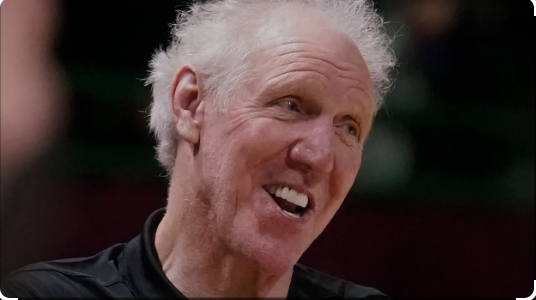Bill Walton, a legendary figure in basketball, is known for his towering presence on the court and his vibrant personality off of it. However, behind the accolades and achievements lies a deeply personal battle that many may not know about. Walton’s journey through cancer has been both inspiring and enlightening. As fans rallied around him during this challenging time, questions arose: What kind of cancer did Bill Walton have? Understanding his diagnosis sheds light not just on his resilience but also on important aspects of health awareness that affect us all. Join me as we explore Bill’s story—his diagnosis, treatment options, and how he faced one of life’s toughest challenges head-on.
Types of Cancer and Their Causes
Cancer is a complex group of diseases, each with its own characteristics. The common types include breast, lung, prostate, and colorectal cancer. Each type originates from different cells in the body, leading to unique challenges.
Understanding causes can be tricky. Genetic factors play a significant role; some individuals inherit mutations that increase their risk. Environmental influences like smoking and exposure to carcinogens also contribute heavily.
Lifestyle choices cannot be overlooked either. Diet, physical activity levels, and alcohol consumption all impact cancer risk significantly.
Certain infections are linked to specific cancers too. For instance, human papillomavirus (HPV) is associated with cervical cancer while hepatitis B increases liver cancer risks.
Awareness of these varied factors helps in making informed health decisions that could potentially lower one’s susceptibility to cancer over time.
Bill Walton’s Diagnosis: Non-Hodgkin Lymphoma
Bill Walton’s journey took a challenging turn when he was diagnosed with Non-Hodgkin Lymphoma. This particular type of cancer affects the lymphatic system, which is crucial for immune function.
His diagnosis came as a shock to many fans and loved ones. For someone known for his vitality and energy, facing such an illness seemed surreal.
Non-Hodgkin Lymphoma encompasses various subtypes, each presenting unique challenges. It’s often characterized by swollen lymph nodes, fever, weight loss, and fatigue—symptoms that can be easily overlooked initially.
Walton faced this battle head-on with resilience. He became an advocate for awareness around the disease while navigating his own treatment options alongside medical professionals. Through it all, he maintained a positive outlook that inspired those around him.
Treatment Options for Non-Hodgkin Lymphoma
Treatment for Non-Hodgkin Lymphoma varies significantly based on the type and stage of the disease. Chemotherapy is a common approach, using powerful drugs to target cancer cells. This method can be effective but often comes with side effects like fatigue and nausea.
Radiation therapy may also be utilized. It focuses high-energy rays on cancerous areas, shrinking tumors or eliminating them entirely.
For some patients, targeted therapies are an option. These treatments specifically attack certain characteristics of lymphoma cells while sparing healthy tissue.
Immunotherapy has gained traction in recent years as well. By enhancing the body’s immune response, it empowers patients to fight off cancer more effectively.
Clinical trials present another avenue for those willing to explore innovative treatments not yet widely available. Each treatment plan is personalized, aiming for the best possible outcome tailored to individual needs.
How Did Bill Walton Cope with His Diagnosis?
Bill Walton faced his cancer diagnosis with remarkable resilience. He embraced a positive mindset, drawing strength from his family and friends. Their support provided a solid foundation during uncertain times.
Walton also turned to physical activity as a coping mechanism. Even while undergoing treatment for Non-Hodgkin Lymphoma, he continued to engage in light exercises. This not only kept him active but also uplifted his spirits.
He found solace in sharing his experiences publicly, raising awareness about the disease. By speaking openly about his journey, he connected with others facing similar challenges.
Music became another outlet for Walton during this period. His love for music offered comfort and distraction from the rigors of treatment. It allowed him to express emotions that words sometimes couldn’t capture.
Through these avenues, Bill Walton transformed adversity into an opportunity for growth and connection.
The Importance of Early Detection and Prevention
Early detection of cancer can significantly change the course of treatment. When diagnosed in its initial stages, many cancers are more manageable and have better outcomes.
Regular check-ups and screenings play a crucial role in identifying potential health issues before they escalate. This proactive approach empowers individuals to take charge of their health.
Preventive measures also cannot be overlooked. Lifestyle choices, such as maintaining a balanced diet, exercising regularly, and avoiding harmful substances like tobacco, contribute to reducing cancer risk. Awareness is key; understanding family history can guide those at higher risk toward appropriate screening schedules.
Education on warning signs is vital for early intervention. Recognizing symptoms early could lead to swift action and improved prognosis. Prioritizing both detection and prevention creates a strong defense against this relentless disease.
Conclusion
Bill Walton’s journey through cancer serves as a poignant reminder of the challenges many face. His diagnosis of non-Hodgkin lymphoma not only highlights the complexities of this type of cancer but also underscores the resilience required to combat it.
As we reflect on Bill’s battle, it’s essential to acknowledge the importance of awareness. Understanding what kind of cancer did Bill Walton have encourages discussions about early detection and prevention methods that can save lives.
Walton’s story continues to inspire those navigating similar struggles, reminding us all that hope and strength can emerge even in our darkest moments. Embracing knowledge about various cancers, including non-Hodgkin lymphoma, empowers individuals and communities alike toward better health outcomes.
